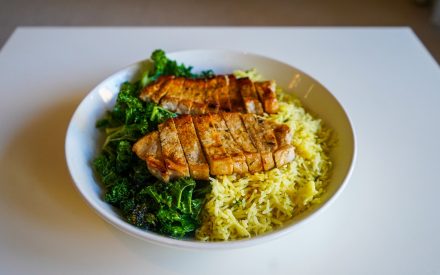By now, you and your baby have gotten to know each other well. Now it is on to the next challenge of starting solid foods! This is an exciting time for your baby to explore foods, especially, foods your family eats.
Starting solid foods
- At about 6 months old, start looking for cues that your baby is ready for solid foods.
- she can sit up with some support and hold her head steady
- she will recognize food and open her mouth when a spoon approaches
- she no longer pushes food out of her mouth
- she can use her tongue to move food to the back of her mouth to swallow
- Be patient with your little one. It may take 10 to 15 tries before your baby will eat a new food.
- Continue to breastfeed or give your baby formula for at least the first year of life. This is still an important source of nutrition and provides other health benefits.
- Do not give your baby cow’s milk until after his first birthday. Before one year, he will not be able to digest cow’s milk and it will hurt his intestines.
- Your baby needs his first food to be a good source of iron and zinc; fortified baby cereals, and baby meats or ground fish are good first choices.
Feed your baby at 6-8 months
Offer your infant a small amount of soft food 2 to 3 times per day. As she gets better at eating, slowly make the food thicker and lumpier.
Good foods to offer:
- Fortified infant cereal
- Ground meat, fish, or poultry
- Strained or mashed vegetables and fruits
- Sticky rice or mashed potatoes
Feed your baby from 8 to 10 months
Now, your baby bites and chews food and gets better at using a cup. Offer your baby foods with more texture. There is no need to add salt, sugar, or fat to food.
Good foods to offer:
- Cut-up, cooked vegetables and soft fruits
- Finely ground or small pieces of tender cooked meat, poultry, and boned fish
- Mashed and cooked beans and lentils
- Strips of bread, toast, or tortilla
Feed your baby at 10-12 months
Your baby is very comfortable picking up food and easily drinks from a covered toddler cup. Baby can start to have foods cut up into small pieces.
Good foods to offer:
- More kinds of cooked vegetables and soft fruits
- Tender chopped meats, poultry, and boned fish,
- Cooked dry beans, peas, or lentils
- Soft-cooked pastas
- Cottage cheese or yogurt
What about allergies?
If you are concerned about allergies and have a family history of food allergies, talk to your doctor. Introduce one new food at a time. Watch for any symptoms of food allergies for 2 to 4 days before introducing another food. If you see diarrhea, vomiting, rash, stomach ache, or trouble breathing, call your doctor. We now know that for MOST babies, withholding foods until they are older does NOT prevent allergies, and may even increase the risk of allergy development.
Drinking from a cup?
Around 6 months, begin to teach your baby to drink from a cup. Use a covered cup with handles, a weighted bottom, and no valve. Don’t let your little one carry a cup around. Sipping on beverages throughout the day can lead to cavities. Babies should not have juice before they are 12 months old. If you choose to offer juice after that, do not offer more than 4 to 6 fluid ounces per day and only with a snack or meal.
Heads up! For safety
- Wash your hands and your baby’s hands with soap and warm water before any meals or snacks.
- Wash the high chair tray with hot, soapy water whenever it is used.
- Do not feed your baby food directly from the jar. Feed from a dish with only as much baby food as you need, and throw out any uneaten food in the dish. Refrigerate food left in the jar for up to 3 days.
- Sit with your baby while he or she is eating so you can see any signs he is full and to make sure he is safe.
- Don’t give your baby honey until after his or her first birthday. Before one year, honey can cause a deadly disease called infant botulism.
How to avoid choking
- Seat your baby in a chair whenever feeding.
- Don’t give him or her foods that are round and firm, sticky, or cut into large chunks.
- Cut any foods for babies and toddlers into pieces no larger than a half inch.
- Don’t give your baby whole nuts and seeds, popcorn, chunks of raw vegetables, whole grapes, cherries, hot dogs, larger chunks of meat or hard cheese, chunks of peanut butter, or hard candy.
Resources to explore
Nutrition resources for feeding your baby, from The American Academy of Pediatrics:
For more on keeping your baby’s food safe, information from the USDA:

 Nutrition for newborns: birth to six months
Nutrition for newborns: birth to six months Helping toddlers try vegetables
Helping toddlers try vegetables Balancing food and physical activity
Balancing food and physical activity Nutrition for aging
Nutrition for aging


